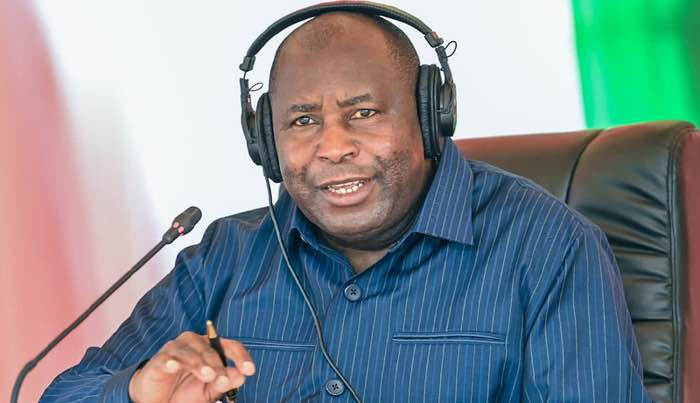
President Ndayishimiye pledges his support to Rwandan youth in their efforts to overthrow the Rwandan government
The Government of Rwanda deplores the inflammatory and un-African statements made by Burundian President Evariste Ndayishimiye during an event in Kinshasa on 21 January 2024.
Rwanda has through a statement indicated that “President Ndayishimiye, acting in his capacity as the African Union Champion for Youth, Peace and Security, in an event advertised under the banner of the continental organisation, made several baseless and incendiary allegations aimed at inciting division among Rwandans, and further jeopardizing peace and security in the Great Lakes Region.”
During the event, President Ndayishimiye engaged with over 500 Congolese youth and openly pledged his active support to Rwandan youth in their efforts to topple the current government.
The former Burundian Hutu rebel leader does not hide his intention to train young Rwandans, whom he considers “prisoners” in their country, against his Rwandan counterpart Paul Kagame whom he accuses of destabilizing the sub-region.
The Rwandan government emphasized that “Rwandans have worked diligently to strengthen unity and foster the country’s development. Young Rwandans have embraced this opportunity, are taking ownership and actively contributing to building a brighter future for themselves.”
“For anyone to try and undermine this progress by calling on young Rwandans to overthrow their government is troubling. But for a leader of a neighbouring country to do so, from an African Union platform, is deeply irresponsible and a flagrant violation of the African Union Charter” says the Rwandan government in the statement.
“Rwanda has no interest in creating conflict with our neighbours. We will continue to work with partners in the region and beyond to foster stability and continued development”, the government further underscored
President Ndayishimiye was in Kinshasa for the swearing-in ceremony of re-elected President Félix Tshisekedi, “his brother” according to his remarks.
The Burundian President asserted that while the population in the region lives decently, the core issue lies in what he perceives as “bad leaders.” He expressed unwavering determination to persist in the struggle until Rwandans themselves apply pressure on their leaders.
“This is a regional issue; first, there is the unity of citizens. I know there is no problem between citizens; it’s bad leaders. As in the army, they say there are no bad troops; it’s the commanders who are bad. So, at this moment, I believe our struggle must continue until the Rwandan people also start to exert pressure on their leaders because I see that Rwandan youth cannot accept being prisoners in the region. Me, as the African Union Champion for Youth, Peace and Security, I could organize this meeting (with young Rwandans), there must be a meeting of young people,” suggested the Burundian President.
President Ndayishimiye called on the Congolese to “be united to fight together” against Rwanda. He said that Congolese must remember one thing: “Help yourself and the world will help you.”
President Ndayishimiye’s position aligns with that of his counterpart from the Democratic Republic of Congo (DRC), Félix Tshisekedi, who also promised to declare war on Rwanda if he is re-elected.
President Félix Tshisekedi, who was re-elected for a second term, accuses Rwanda of supporting the Congolese M23 rebels. What Kigali has always denied.
After accusing Rwanda of supporting RED-Tabara, a rebel group which carried out attacks on its soil from the DRC, Burundi decided unilaterally to close its borders with its Rwandan neighbor which rejects these allegations.
Relations between Burundi and Rwanda have often been tumultuous. A slight improvement was noted after Évariste Ndayishimiye came to power in 2020, but since then ties have weakened again when Burundi sent troops to help fight M23 rebels in eastern DRC.
Burundi had already closed its border with its Rwandan neighbor in 2015, with the two countries accusing each other of supporting rebel movements. The border was reopened in 2022. (End)
